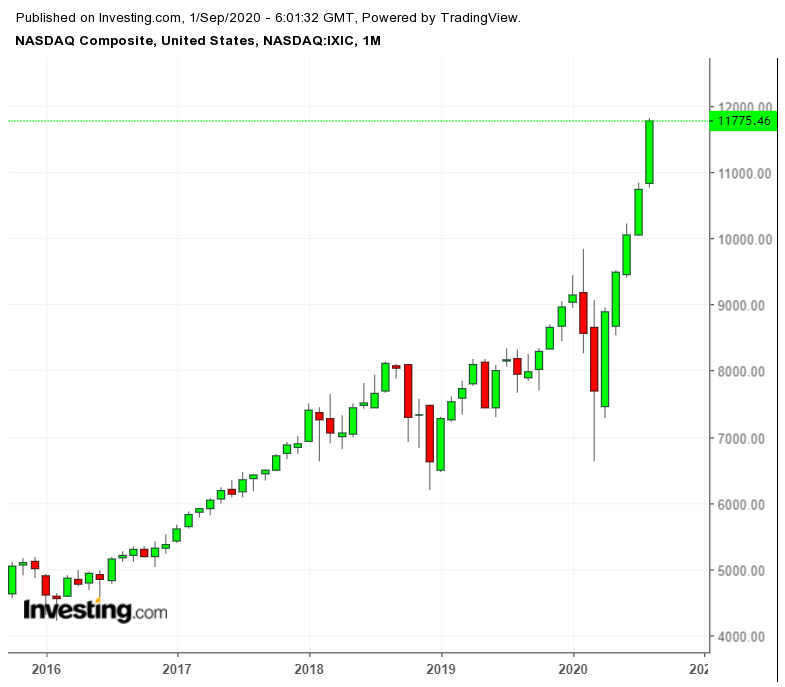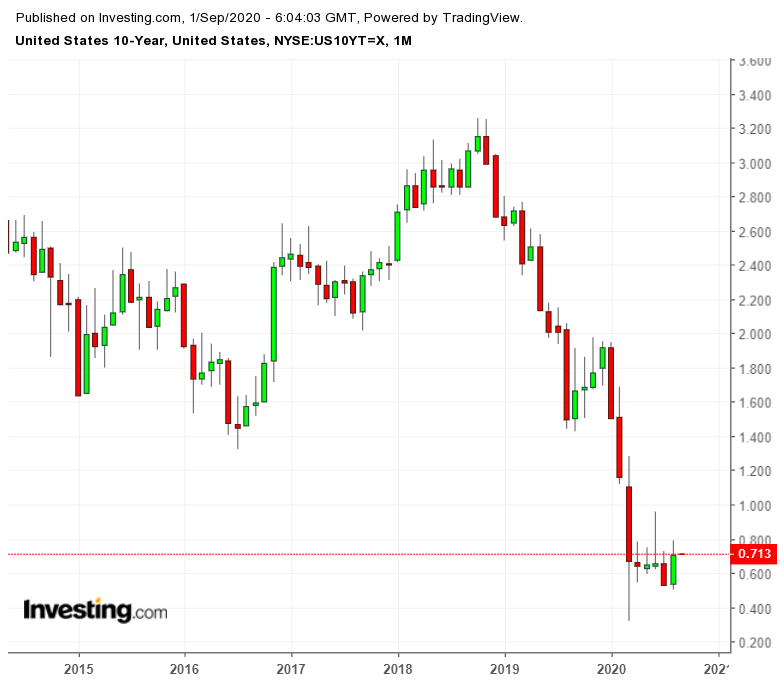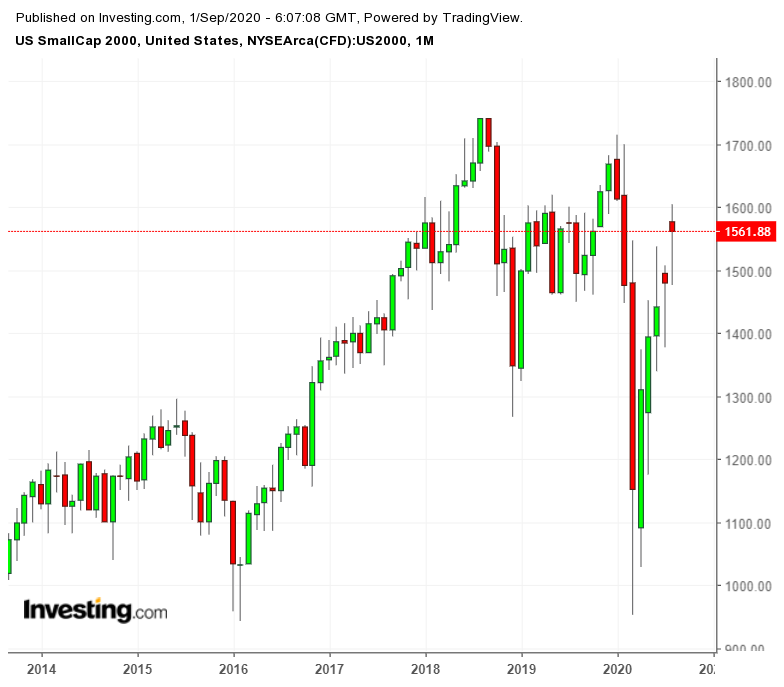The stock market finished August with its fifth monthly gain as one of the strongest rallies since 2000 continued pushing higher.
Indeed, this rally looks like it has enough momentum to last a while. Of course, there's one big reason for that: the Federal Reserve is all in on getting people back to work. As well, it probably won't boost interest rates from ultra-low levels this year or next.
The NASDAQ Composite Index is up 77.6% since bottoming on March 23; the S&P 500 Index is up 59.7% during that same time, and the Dow Jones Industrial Average up more than 56.1%.
Best August In Years
Over the period, by far the strongest performers have been the tech-heavy NASDAQ and NASDAQ 100 indices, up 31.2% and 38.7%, respectively. Both hit new highs on Monday and have been reaching record levels regularly since mid-summer. During that time, the SPX has gained 7% and has achieved its own new highs.

And, as of Friday, the Dow Jones finally recovered all its losses triggered by the pandemic and was up 0.4% for the year. But Monday's 224-point loss put the index back into negative territory for the year, down 0.38%.
Overall, these major index performances provided investors with their best August in years—since 1984 for the Dow and S&P 500 and 2000 for the NASDAQ.
Since the March crash, tech shares have been the greatest beneficiaries of risk-on appetite. Amazon.com's (NASDAQ:AMZN) CEO Jeff Bezos' net worth has been boosted to $200 billion. As well, four companies—Apple (NASDAQ:AAPL), Microsoft (NASDAQ:MSFT), Amazon and Alphabet (NASDAQ:GOOGL)—each ended the month with market caps of $1 trillion or higher. Apple's market cap is an eye-popping $2.2 trillion.
While investors are ecstatic, they should also be asking themselves when this rally will end. Here are 6 ways this could happen:
1. When the Fed starts raising rates
As we noted above, that's not happening this year or next as global central banks continue coping with the devastation wrought by COVID-19. But when rates do go up, look out.
Low rates are creating risks because many investors in search of yield can now only get reasonable returns from stocks. The 10-year Treasury yield was 0.69% yesterday, compared with 2.446% at the end of 2016 and 6.43% at the end of 1999.

Because of the pandemic, money has been focused on a few investment classes, especially tech stocks, housing, digital entertainment and consumer staple providers with the infrastructure to deliver value and efficiency. Think Amazon, Walmart (NYSE:WMT), Target (NYSE:TGT), Costco Wholesale (NASDAQ:COST), Home Depot (NYSE:HD) and Lowe's (NYSE:LOW).
Apple, whose shares split 4-for-1 on Monday is up 75.8% this year. Based on its weighting on the 30-component Dow, it's added 1,400 points to the mega cap index by itself, and it represents about 14% of the market cap of the NASDAQ 100.
2. If technology stocks sell off and other sectors can't pick up the slack
Growth stocks have ruled since March. Value stocks on the other hand, which include banks, traditional industrials and the like, have struggled. Tesla (NASDAQ:TSLA), which split 5-for-1 on Monday, is up more 496% this year—nearly 74% in August alone. A big tech sell-off would probably be triggered by an abrupt rise in interest rates or a geopolitical event such as a new eruption in US-China tensions.
The risk to growth stocks seems to be accelerating. The relative strength indexes (RSIs) for the NASDAQ and NASDAQ 100 were both approaching 77, suggesting both indices are overbought. The S&P 500, whose rally has been fueled by growth stocks, also has an RSI of 77.
The S&P 500 last saw those levels in January and February, suggesting a first quarter selloff. Indeed, that sell off was a monster.
3. If the nascent domestic recovery stalls
You can see a recovery in swelling sales of single-family homes, prompted by families seeking to get out of the way of the pandemic. If home sales are robust, that's good for appliance sales, tool sales and paint sales. Sherwin-Williams (NYSE:SHW) shares are hovering around their 52-week high and are up more than 16% this quarter alone.
Likewise, shares of railroads, trucking companies and logistics companies have been rising, as investors are clearly expecting a recovery to strengthen. The Dow Jones Transportation Average is up 2.6% for the year. Landstar (NASDAQ:LSTR) is about 9.3%. JB Hunt Transport Services (NASDAQ:JBHT) is up nearly 10% this month. Package delivery giant FedEx (NYSE:FDX) has jumped 30.6%.
But pushing against this rosy scenario is the real prospect of huge layoffs in airlines, hotels and other hard-hit industries, and employees who had been furloughed being told their jobs are gone. At the same time, the pandemic has erupted again and again forcing shutdowns of schools, colleges and business and causing havoc for governmental finances.
4. If November's election ends up in the courts
If he loses, no one expects Donald Trump to leave without a fight. Thus, if the combination of slow vote counts and Trump trying to wrest a victory via the courts emerges, the domestic stress may be greater than it was when the Bush-Gore race went all the way to the Supreme Court in 2000.
5. If oil prices move sharply higher
Saudi Arabia and Russia (along with shale drillers in the United States) are both desperate for higher oil revenues, but COVID-19 gutted travel and huge amounts of local economic activity. A sudden and rapid jump in oil prices, set off by, say, a war in the Persian Gulf, could easily choke off a recovery. Record oil prices in the spring and summer of 2008 were real contributors to the Great Recession.
It doesn't look likely now. Brent crude, the global benchmark, fell below $20 in March and has nearly tripled since. But at around $45 a barrel, Brent is still down 31% for the year and 48% from a high reached in 2018.
6. If the rally isn't uniform
The Russell 2000 Index, which tracks smaller-cap companies, is still down 5.4% for the year. Unless they are among the select few like Moderna (NASDAQ:MRNA) or Novavax (NASDAQ:NVAX), with a potentially promising coronavirus vaccine in the pipeline, biotech stocks are struggling.

Moderna fell 12.4% for August, but excitement about its vaccine's potential success has sent its shares up 232% this year—even though the company has never brought a drug to market. Novavax has also slumped in August, down some 25%. But its shares are still up 2,672% for the year.
Eighteen of the 30 Dow stocks are down for the year, even after the recent reshuffle, which added biotech giant Amgen (NASDAQ:AMGN), industrial conglomerate Honeywell International (NYSE:HON) and software company Salesforce.com (NYSE:CRM). (While removing Pfizer (NYSE:PFE), Exxon Mobil (NYSE:XOM), a Dow member since 1928 and Raytheon (NYSE:RTN) Technologies (NYSE:RTX).
It's one thing to have a big tech-driven rally. But as the dot-com bust showed, tech can't do it alone.
Current Dow winners are Salesforce, Apple, Nike (NYSE:NKE) and Disney (NYSE:DIS). Its weakest performer is Cisco Systems (NASDAQ:CSCO), off about 10.4%.
Top S&P 500 stocks for August were MGM Resorts International (NYSE:MGM), Royal Caribbean Cruises (NYSE:RCL), aluminum maker Arconic (NYSE:ARNC), fertilizer company Mosaic (NYSE:MOS) and Salesforce.com.
The benchmark's weakest performers: Nektar Therapeutics (NASDAQ:NKTR), medical-equipment company Becton Dickinson (NYSE:BDX), cloud services company Arista Networks (NYSE:ANET), oil company Occidental Petroleum (NYSE:OXY) and utility company Evergy (NYSE:EVRG).
Airlines continue to struggle. American Airlines Group (NASDAQ:AAL) and United Airlines (NASDAQ:UAL) are each still down more than 50% and have warned employees of the huge layoffs this fall.
There is an old saw in financial circles: Don't fight the Fed. If you believe inflation is about to explode, remember the Fed and its considerable power to influence financial markets is right now likely to push against your position. Investors who've tried to make that trade work in recent years have learned painful lessons.
At the same time, markets can get derailed by a completely unforeseen event like the COVID-19 panic, which cut a third of the value of U.S. stocks in roughly a month.
This is an important point to remember considering the rich valuations stocks now have in a volatile economic and political environment.
